#at least young Ralph Fiennes was ugly-got
Text
I knew Wuthering Heights was gonna be fucked up but with the way that Miss Bella Swan idolised it, I figured it would be at least be incredibly romantic. this is just creepy.
I liked the cousins at the end tho, surprisingly.
#I don’t like any of these characters#and I don’t like Cathy and Heathcliff’s romance either#at least young Ralph Fiennes was ugly-got#*hot#I have no wifi atm and my mobile data is spotty at best so I can’t look up what I’m meant to think#or other peoples analysises#but I’d like to think we’re not meant to like Heathcliff and Cathy together by the end#but that we ignore the part of the cousins getting together bc they’re sweet and non toxic#still. that’s the genre.#wuthering heights
4 notes
·
View notes
Text
the many faces of tom riddle, part 5
- more myth than man... or not? the mortality of tom riddle and the anatomy of a villain-
That leaves us with Ralph Fiennes’ portrayal of adult Tom Riddle/Lord Voldemort in movies 4-8.
I generally find adult Tom Riddle disappointing, even in the books, in terms of character depth. Instead of delving into his motivations and the inner psychology of a villain, we get... slight body horror? And in the movies, it’s even more egregious.
If a story is as good as its villain, adult Tom Riddle is a bit of a let-down, especially on-screen.

“I was ripped from my body, I was less than spirit, less than the meanest ghost . . . but still, I was alive.”
Perhaps the very first time I watched it, I found this scary, but I must confess that nowadays, Voldemort’s resurrection is more funny to me than anything else. The forked tongue and the nose slits, yes, are supposed to allude to Tom Riddle’s loss of humanity, but I don’t think it...worked out that way in practice.
I know that’s how it is in the books, but ugly equals evil (and vice versa) is a tired trope. not only that, but under the CGI, Lord Voldemort is so difficult to relate to, so inhuman, that it’s hard to (1) see his true depravity (2) connect with him emotionally (3) at least for me, not laugh at him flapping around the graveyard in GOF like an oversized crow.
Now, the reason I’m going on about this is not (just) me being petty. Lord Voldemort is the Boggart for most of the characters in the HP universe, meaning their greatest fear is Lord Voldemort. He represents Fear; as such, he should be utterly terrifying. Now, I don’t mean horrifying in that sense, but Voldemort’s grand entrance should at least feel somewhat unsettling, have some sort of a Gothic atmosphere...
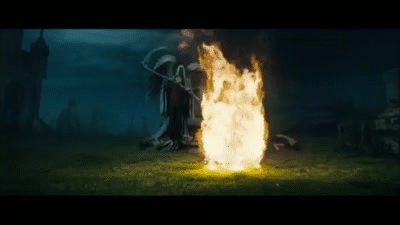
"But then, through the mist in front of him, he saw, with an icy surge of terror, the dark outline of a man, tall and skeletally thin, rising slowly from inside the cauldron."
Visually, this looks great. But it’s not scary. And I’m not a purist by any means, but the words are scarier than the book. Darkness induces fear.
“The lack of any kind of visual stimuli increases anxiety, uncertainty, and tension.”
So, having Voldemort’s pale body materialize isn’t as scary as it could be.
Furthermore, I think Fiennes’ overexaggerated expressions would actually come across as properly horrifying/threatening rather than funny if they just left his face alone. Yes, Fiennes does manage to emote the fear and the anger through the CGI, but it’s like he’s too alien to be scary, at least to me. The amount of memes with Voldemort suggest I’m not the only one this way inclined.
I think there’s probably a problem going on with the uncanny valley. (Images from the Mori essay linked).
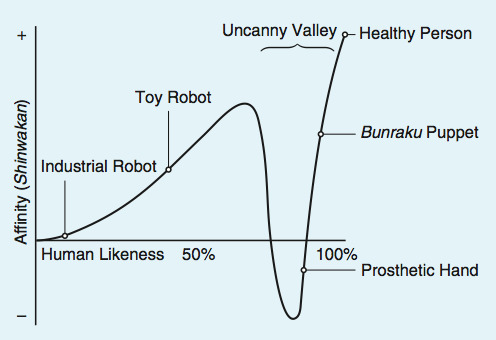
[When things are still]
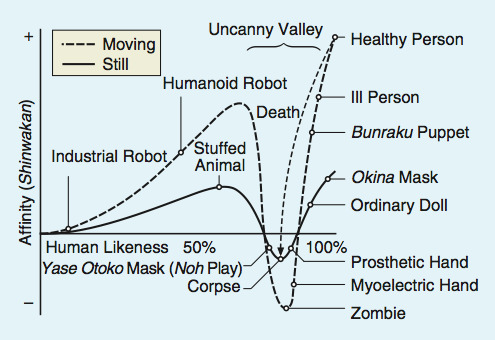
[Creepy things are creepier when moving]
Now, I assume Voldemort is meant to be zombie-creepy, or at least that how Harry describes him in the books.
"The thin man stepped out of the cauldron, staring at Harry...and Harry stared back into the face that had haunted his nightmares for three years. Whiter than a skull, with wide, livid scarlet eyes and a nose that was flat as a snake's but with slits for nostrils...."
Now, we can’t get Harry’s experience of being haunted by Voldemort in his dreams, because what I think makes Voldemort’s countenance so truly frightening to the other characters isn’t his snake-like nose or his red eyes, but the potential. Voldemort is, in essence, the Grim Reaper. You are at his mercy, and you’re probably going to be dead.
“This time, I shall enter the fray myself, Harry Potter, and I shall find you, and I shall punish every last man, woman, and child who has tried to conceal you from me. One hour.“
And yes, Voldemort can be quite funny and witty, but..
“I will allow you to perform an essential task for me, one that many of my followers will give their right hands to perform.” (To Peter Pettigrew)
...it’s still incredibly dark, sadistic humour. Whereas the teenage Tom Riddle we’ve been discussing has just barely dipped his toes into evil, Voldemort is, well... swimming in it. At this point, he think he undeniably enjoys causing pain.
And much of what makes Voldemort scary is subtle.
For example, what I personally consider haunting is the fact that he’s got a cave full of Inferi. A cave full of reanimated dead bodies.
Either he dug them up, which is unlikely... or perhaps, a twenty-seven-or-so-year-old Tom Riddle would lie in wait like a bird of prey, very quietly and patiently, perhaps reading a book, waiting for an unsuspecting Muggle to wander past. Maybe killing is a game to him at this point, when it’s not so personal as killing Harry Potter. Maybe it’s a whispered Avada Kedavra, and then he carries the dead body away to his cave. Maybe he Imperiuses them to walk off the cliff. Maybe he tortures them first.
Shudder.
And I don’t think you can show that kind of horror through any CGI or make-up, so...
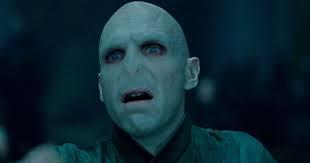
You know what is terrifying? Revolting? True crime; real-life people who do unspeakably horrible things. And I think a lot was missed out on, in stripping Tom Riddle physically of his humanity. Yes, Riddle is a monster...
But, as we’ve seen, he’s a human monster, not some eldritch horror from the seventh level of hell or something.
I just think it would be interesting to have this perfectly normal-looking human do all the horrific things Voldemort does. I want to see that sick joy in a human face and feel disgusted. I want to see fear make his bottom lip tremble, and feel a misplaced sense of empathy. (Think President Snow from the Hunger Games -- now, that’s a sick, twisted villain who we can relate to as a human being, but still love to hate -- or what about The Joker?).
And out of everything they chose to CGI, why on earth did they not make his eyes scarlet? That might have made him look at least somewhat menacing, rather than a failed lab experiment.
(Don’t even get me started on his and Bellatrix’s death scenes in the movies-)
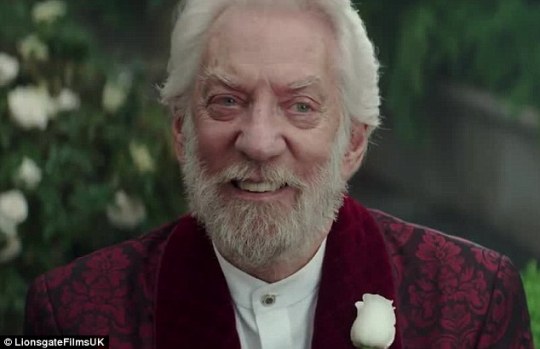
Here’s President Snow. He’s got a cute little granddaughter, he sends kiddies to kill each other Battle Royale-style every year, and he poisons all his political opponents. He’s also a master manipulator and has a penchant for white roses. They cover up the smell of the sores in his mouth from eating the poison too, to conceal his treachery.
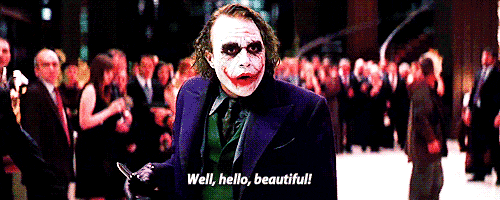
Heath Ledger as the Joker in Dark Knight (2008), who is, according to NYT (which I totally agree with), the best Joker. Now this is a villain done right, with many Voldemort-like traits. On a scale of one-to-ten, he’s absolutely terrifying. Why? He’s (unlike Voldemort in the movies) incredibly intelligent, shows young-Tom-Riddle-like skills for charm and manipulation, plays with humans like they’re his own personal psychology experiment (and to hell with the Institutional Review Board), and has one, single, very clear goal -- chaos. Like Voldemort, he wears an inhuman mask that’s not horrifying in its own right; but unlike Voldemort, the human is all there -- terrifying, real, and with a bottomless, obsessive desire to destroy. His disordered thinking is all out there for the audience to see. The Joker’s motivation is to enjoy himself; whereas Voldemort seems to lack drive. Why does he want to take over the world -- who knows, with Voldemort? The Joker wants to see it burn.
Let’s try to do the same with Lord Voldemort:
[SLIGHT FLASH WARNING]
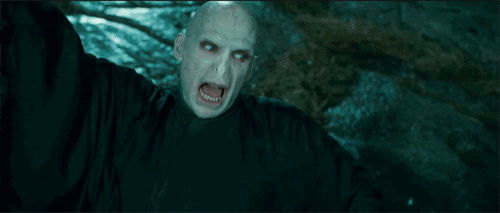
I had to go with this because Voldemort isn’t legitimately terrifying in many scenes. And yes, this unrefined anger somewhat speaks to Tom’s immaturity
By this point, seventy-one year old Tom Riddle is a hollowed-out shell of a human being. After decades of building his power, he was defeated by a one-year-old, and ended up slumming it as a spirit for a decade, got defeated again, was a shrivelled-up baby for a year, then finally got his body back.
He’s angry, okay! And Fiennes does a great job of portraying the sheer, destructive, unbridled rage of this character.
The body language. again, since his face is inhuman, this is super important. and Fiennes’ body language is great. Voldemort/Riddle commits to his actions. He is very emotionally-driven.
But yet, he doesn’t feel capable, in the way that the Joker or President Snow do. Yeah, we know anecdotally that he’s incredibly evil, sadistic, and second only to Dumbledore in terms of power, but he loses to a baby, and then that same baby as a teenager. So, we really could have done with seeing Voldemort’s power, cruelty, and evil firsthand a lot more often.
Voldemort is not well-characterized. I don’t understand his motives, and the ones that I do understand are not compelling.
Not to die? Well, he’s already made several Horcruxes. Why not sit back and relax? Why start a war and risk himself?
JKR said that Voldemort’s great desire was to become all-powerful and eternal. But that’s... boring! It does little to tell us about Voldemort, other than that he’s a villain and a wannabe dictator.
Furthermore, the charm, manipulation, and cunning that are hallmarks of younger Tom Riddle’s personality are gone.
Is Voldemort (to return to Jungian terms) all shadow? An empty creature of simple creation and destruction, perhaps? We’ll discuss this further down...

And this isn’t a problem of having a fantastical world with magic and the like. Grindelwald’s quiet, self-possessed, almost coy “So you think you can hold me?” was infinitely scarier than anything that has ever come out of Voldemort’s mouth. It was chilling.

OOTP is my favorite book, and the Ministry sequence is one of my favourite in the films.
This scene where he psyches out Harry, talking so quietly that he could just be a little voice inside his head (and again, during the possession scene)? Absolute perfection.
Why? Because this showcases what’s truly scary about him. Voldemort can get into your head. He can make you do things. And perhaps, if we had seen that more often, we’d understand how scary he is.
I wish this had been his grand entrance, and not whatever that scene in GOF was. Somehow, him screeching “I WANT TO SEE THE LIGHT LEAVE YOUR EYES!” is not menacing. At all.
But, I can’t help but think how much greater the emotional affect would be if he had more human features (think the burned-and-blurred, waxy features from Dumbledore’s memory).
Just imagine these scenes if Voldemort looked human, and spoke as quietly as he did in this one.
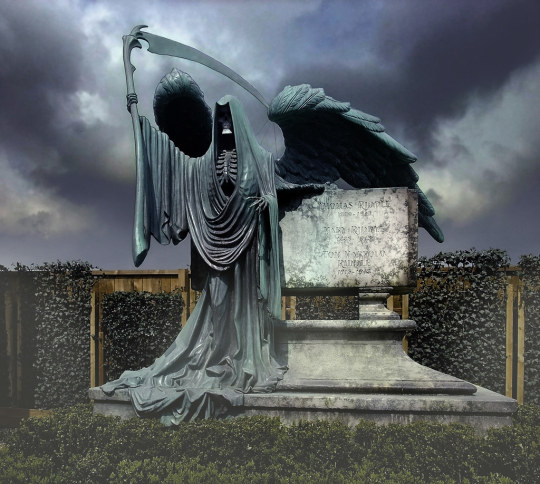
Because of the reason that I have little to go on in terms of characterization that I haven’t already covered, we’ll discuss the myth and legend of Lord Voldemort.
I can’t decide if the statue in the films is supposed to be the Angel of Death or the Grim Reaper. He has a skeleton and carries a scythe, but he also has wings. There are so many different interpretations, attitudes towards, and personifications of Death across the world that I don’t want to draw any one conclusion. But I must wonder if Lord Voldemort, with his yew-and-phoenix wand (which carries heavy symbolism of immortality and rebirth) and almost deified figure is meant to be a personification of Death himself? His name, Lord Voldemort, is a shade close to Lord Death.
For years, it has stumped me that wizards and witches are afraid to utter Voldemort’s name, especially since we only see the Taboo in the middle of the last book. It didn’t make sense just based on fear; in the real world, we don’t circumvent Hitler’s name, for example.
Perhaps this may have been obvious to others, but it wasn’t to me.
Here’s a counterargument to myself; why Voldemort shouldn’t look human.
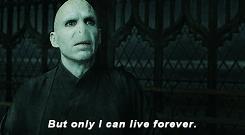
Voldemort, in the Wizarding World, is seen as a literal deity.
I promised to attempt to answer this question in Part 3:
And so, I can’t help but wonder if the opposite is true… if Tom Riddle creates Horcruxes, would that grant him additional magic powers?
In Part 3, I likened Tom Riddle to a sorcerer in Russian folklore, Koschei the Deathless, also famous for sequestering his soul in objects. This source suggests that Koschei was considered not an ordinary magician, but a representative of the ‘other’ world, the world of death.
So, what if... creating Horcruxes makes you... more than human? Now, I could definitely see god-like status being appealing to sixteen-year-old Tom Riddle. Perhaps, even appealing enough to kill for. Now, his proclivity for Avada Kedavra makes sense. We know it’s an incredibly sinister spell, but at the same time, it’s a very humane way to kill. Why might it be so horrifying?
Here’s a weird theory.
To the best of my knowledge, no one but Voldemort is seen using the Killing Curse more than once or twice.
Perhaps, ordinary mortals can only cast Avada Kedavra a few times, but Tom, having split his soul and having become in some way a non-human instrument of Death, can cast it however many times as he likes, and that is part of what serves to make him so terrifying.
This makes the idea of Voldemort tossing around Avada Kedavras actually incredibly terrifying, if you take into account what that might mean.
The collective cultural fear of speaking Voldemort’s name supports this theory.
Take the chthonic (underworld) deities of Greek mythology; most notably, Hades and Persephone, the king and queen of the underworld.
Hades, the god of the dead, was feared.
So feared that the word ‘Hades’ (”the unseen one”) was so frightening, that people came up with all sorts of euphemisms to circumvent actually saying it and he was rarely even depicted in art. For example, they would refer to him as Pluto (”the rich one”), Clymenus ("notorious"), Polydegmon ("who receives many"), and perhaps Eubuleus ("good counsel" or "well-intentioned"), amongst many other names.
However, he was not seen as evil; just stern, cruel, and fair. Like most Greek gods, he had an associated cult (the Death Eaters, anyone?)
Another interesting connection between Hades and Voldemort is that Hades was associated with snakes.
Persephone (suggested to have a pre-Greek origin and probably pre-dates Hades), who was also a vegetation/fertility/spring goddess, similarly, was referred to as Despoina (”the mistress”), Kore (”the maiden”), etc, because as the terrible Queen of the Dead, it was considered unsafe to speak her name aloud. In mythology and literature, she is sometimes referred to as ‘dread Persephone.’
--Just like how Lord Voldemort is referred to as The Dark Lord, He-Who-Must-Not-Be-Named, You-Know-Who... (and if you’re Dumbledore, ‘Tom’.)
Her central myth served as the context for the secret rites of regeneration at Eleusis (which was basically a mystery cult devoted to her and her mother, Demeter), which promised immortality to initiates.
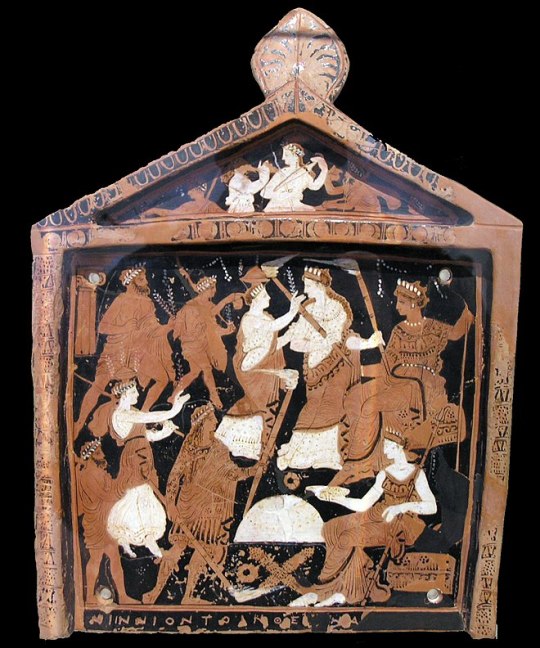
We don’t know for certain what exactly went on, because, mystery cult -- the members were sworn to secrecy -- but it revolved around immortality and rebirth and possibly psychoactive drugs.
Perhaps ironically, in comparison to the Death Eaters, anyone could join, as long as they could speak Greek and had never committed murder.
And that concludes my assessment!
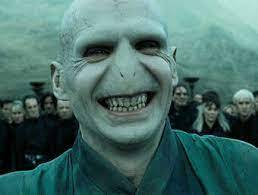
#tom riddle#the many faces of#tom marvolo riddle#character analysis#lord voldemort#character study#tw: murder#the body horror was 1/10#don't make your character design hilarious if you want him to be scary#i'm not saying voldemort is a vegetation deity#but i'm not-not saying it either
52 notes
·
View notes
Text
A while ago there was an interview going round with Luca and Armie, published in the German Vogue in January 2017. I finally got hold of a copy and translated it into English.
@foryou-insilence - it’s on it’s way to you!


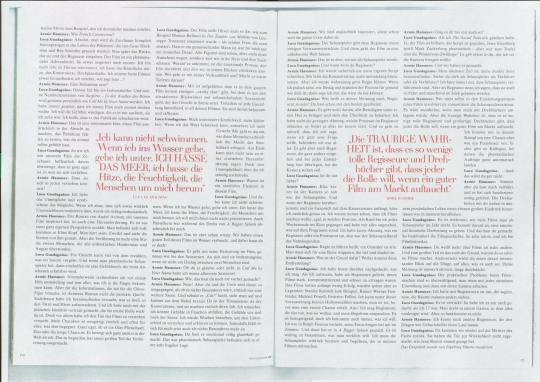
Just a few remarks:
I’m not a translator, so this is just what I made of it. I tried to give a choice of words when the meaning could have different nuances. If you have any questions, just ask. If anyone has better ideas how to phrase or translate it, pelase, have at it.
I think the interview was conducted in English, then translated into German, and now I translated it back into English. Something might have been lost along the way.
It seems a bit jumpy in topics, so I think it was initially longer or they omitted the questions asked by the interviewer.
They use the informal you (Du) in the German text instead of the more formal address (Sie), indicating a relationship of equals. I also got the feeling that it was done during filming, because they both often use present tense when talking about CMBYN.
If anyone wants a scan just send me a PM and provide an email address.
Completed! [Could also mean 'hyphy']
Director Luca Guadagnino and actor Armie Hammer talk the power of sensuality, ugly beauty and sex in front of the camera
The Italian director Luca Guadagnino is a master of the emotional intimate drama like I Am Love (with Tilda Swinton) and A Bigger Splash (with Ralph Fiennes) which unsettle and enthrall through their intensity. Armie Hammer distinguished himself through his multilayered interpretation of discrete parts/roles, not least his dual role as the Winklevoss-twins in The Social Network. Now, Luca Guadagnino earmarked for him the part of Oliver in his film based on Andrè Aciman's novel Call Me By Your Name (Berlinale 2017), a young American drawn into an amour fou.
For this Vogue talk, both met in the Palazzo Albergoni in Lombardy, a century-old villa, that is, in the movie, inhabited by an American Professor, his Italian wife and their 17-year-old son Elio. Oliver is a guest at their house, and like him, Armie Hammer was transformed by his Italian experience.
AH: We already talked about that the mood of the film is relaxed and at ease. Thanks to you [in the translation, the informal 'you' is used], this is also true beyond the camera. And that even despite the difficult circumstances, the rainy weather, for example.
LG: This happens without me thinking about it. I like having guests. And this film is about someone who is a guest, a visitor. Many aspects of human relationships can't be controlled, but some stuff can be defused/disarmed. Filming is a hectic process/action full of conflict, related to personal discomfiture/unease. Filming A Bigger Splash was all about that. This time I wanted to avoid such tension. But there's always inner tension, that mounts through shooting and is connected to the content of the film. I try to channel the intensity within my staff into the story. Especially the cultural differences between Italian, French and Americans gad to be channeled.
AH: Your movies are always set in Italy, despite their international cast?
LG: It is easier to organize. To tell the truth, I hope this will be the last film for a long time that I shot in Italy. By the way, I wanted to work with you for a long time, and Call Me By Your Name was the right moment to ask you. The international cast wasn't a conscious decision/consideration, it just happened naturally. As a European director I wouldn't cast Americans if it wasn't for the benefit of the story.
AH: I love the filming experience and the life in Crema, where we live. It's the most picturesque little town I can imagine. No one speaks English. That's absolutely new for me as an American, who usually gets through with it [English] everywhere. I immerse myself 24 hours a day into this other world. It's a somewhat analogue experience. My smartphone is usually switched off, mostly because of the time difference. This isolation makes it easier to concentrate on the project. I have the feeling to have ended up in another universe.
LG: Seriously? You don't know this kind of film-making?
AH: Absolutely not. I've never worked with a director with whom i felt clicking from the get go. I just walked into a world where everything is lovable/amiable, the colleagues, you, this villa.
LG: But isn't it always like this? Now you got me interested.
AH: You give me the feeling of being an equal. Here's no hierarchy, the director isn't some kind of god on top [of a mountain] and I, as an actor, stand beneath him, even beneath the author and producer and so on.
LG: So that's how it usually is?
AH: Yes, especially with projects with gigantic budgets made by large studios. With those, you are just an actor who has to fit a casting mold.
LG: As a director, I always feel like a young school child with yet many years before graduating. I still have to learn and research a lot. I don't just want to gain a notion/concept of the fictive characters, but from the actors as well. This stance might spring from films made in the post-war era and exploded in the 1970s. Directors like Scorsese or Coppola blurred the lines between actors, characters and plot. I ask myself how I can do a bigger movie with this attitude/mindset, an action movie for example that I like to do next.
AH: Like French Connection?
LG: Absolutely. As a viewer, one gets completely pulled into the life of the policemen, played by Gene Hackman and Roy Schneider. You sense the risk they and the director have taken. The film is a phenomenal adrenaline rush Something like that is enormously inspiring. I'm not interested in fiction, I hate the artificial, the construed, polished. I want to discover something while filming, I want to, how do you say it...?
AH: You want to be a midwife?
LG: Exactly. I'm a midwife. And my new interpretation of Suspiria will get equally personal as Call Me By Your Name. I always felt that I wanted to do this film again. I want to acknowledge the feelings it evoked in me when I was ten. I hope it will shock the audience.
AH: That is an interesting approach to make a film, to let the audience feel what you once felt.
LG: Just like I hope I can convince the audience with our film that it doesn't matter with whom you fall in love.
AH: That you can fall in love with everyone?
LG: I love the impossible and despise the possible/feasible. When I sense that something impossible is about to become real, I get enthusiastic.
AH: The novel by Andrè Aciman that inspired our film is a challenge as well. It is told from a very special perspective. You are totally in Elio's head. You hear his doubts and see the scenes like he paints them. But the film is more the study of two human being who overcome all conceivable obstacles and fears.
LG: A face can tell a lot about what's going on inside [one's head]. And when you have fantastic actors, they create an emotional world that becomes tangible while watching them.
AH: Usually, I do months of research before I start filming and read everything I can get my fingers on. But the information I need for Oliver can't be drawn from Aciman's novel. Instead, I tried to find out what it meant to grow up during the 70s and 80s. And I tried to acquaint myself with the Jewish identity, which is important for my role. But particularly did I try to understand the atmosphere/mood of the film. My character is curious, sensual/sensible and open for everything that he comes across. It doesn't matter if it's a glass of peach juice, Elio or young Chiara. He moves differently in the world than I do. To understand that was a big part of my preparation.
LG: The film doesn't portray Oliver like Monica Belluci was enacted in Maléna by Guiseppe Tornatore – as a beautiful woman to stare at. That he's a handsome man was but an ironic detail for me. All characters are beautiful, but not because of their outward appearance but because we are allowed to look into their heart and soul. What is important is the emotional journey/process Elio embarks on, and which we can experience through his looks. How does he act on his infatuation/crush? Does he create something deeper/more profound out of it?
AH: I recognized that in the whole movie there isn't one single beauty shot, which is all about the most attractive angle in flattering sunlight, to draw attention to a face. Nonetheless, every angle is gorgeous, in all your films. They are always careful yet cunning/subtle.
LG: I'm interested in sensuality, not beauty. If I hear the word beauty I take up arms. For me, it's about how humans surrender to sensuality. In the end, you can't say no to an erotic challenge. Another impossibility I constantly think about.
AH: Water is a sensual element in this movie.
LG: And I can't even swim. When I set foot into water I drown. I hate the ocean/sea, I hate the heat, I hate the humidity, I hate the people surrounding me, I don't want to present myself naked in front of them. Even Pantelleria [an Italian island] disgusted me during filming A Bigger Splash.
AH: That's kinda funny: we filmed some/huge parts of this film in the water and you hate it!
LG: It's about its meaning in the movie, like the sex scenes. They are meaningless as well if they are not some sort of dialogue between two people.
AH: Believe it or not, I had my first nude/sex scene in Call Me By Your Name!
LG: What? You didn't do this before?
AH: No! But you and the crew just handled it like it wasn't something special, just like every other scene. And as soon as it says 'Cut!' you come up like out of a fog: there's the boom operator, the camera man, just doing their job. I wished I could bottle feelings, the feelings before and after a scene. I would need weeks to understand and explain the difference. Anyway, it doesn't feel like something special/particular for me as well by now.
LG: You did it totally emotionally believable/true. It was fantastic. Actors are in a very fragile place.
AH: We are very exposed, not only because the whole crew is there.
LG: The actor grants the director a huge credit of trust/takes a leap of faith. And then the film is released into an unknown world.
AH: But that's exactly why I became an actor.
LG: And when do you turn into a director?
AH: I certainly will never write my own script. I lack the concentration to devote myself to it for months on end. But I'd madly love to direct. But when I see how effortless and fluent this process is for someone like you, I think I'll never be able to do that.
LG: What does it mean, in your opinion, to be a director? You already worked with the best.
AH: I think it's about to reconcile everyone and always keep track of everything. I have no idea what goes on inside a director, it all happens out of view. And it's so fast that I fear to interfere/impede everything when I ask a question. But there are other directors who work differently, who think out loud prior to every scene, where the camera should be placed.
LG: Do you prefer that?
AH: Of course. No one's so close to the camera as the actor. And if the director walks over and talks to the camera man, I listen closely. I always knew I wanted to work in movies, in whatever job. As a kid I went to the cinema every weekend and watched everything on the bill. I had no idea what a director or producer does, and so actor was the obvious choice.
LG: Directing means to be an outsider. You have to man up for a job that's deep and dark.
AH: Why? What is the reason for this alienation?
LG: Today I thought about what I like. When I grew up, I loved directors who's movies were strong, uncompromising and hard to bear. Those films were inherently unsuccessful but later became legends: Stanley Kubrik, for example, Rainer Werner Fassbinder, Michael Powell, Federico Fellini. I can't make a Hollywood movie under these conditions, you are dead before you get a second chance. Therefore: I like directors who do what they want and address my desires. It is frightening, but I as well always get what I want. I was in love with Ralph Fiennes, his pictures hung in my room. And then he worked with me in A Bigger Splash. It is important to get what you really want. I truly have to own and desire the actors who work on my movies.
AH: Was that the case with me as well?
LG: When I saw The Social Network: yes, the film is brilliant, the script is great, Jesse Eisenberg is a fantastic Mark Zuckerberg – but who the fuck are the Winklevoss twins? There was something in you that I wanted to bring out in front of a camera.
AH: And we did it.
LG: My next goal is to find/expose your dark side. As an actor, are you seduced or a seducer? I always hear that actors are seductive. But as a directorI have to say that they also get seduced and sometimes even betrayed.
AH: Those who are not involved in the process of film-making romaticize the existence of actors. It would be wonderful if I was mobbed with scripts. But the truth is, there are so very few fine directors and great scripts that everybody wants the part as soon as it hits the market. In this fight for the one chance I feel like a prize boxer. Sure, there are colleagues who automatically receive fantastic offers...
LG:... but you don't want that, not really.
AH: True, but you seduced me and it was 100% worth it. Filming with you left a huge impression in my personal and professional life.
LG: It is irrelevant how many films you do a year as an actor. The only important thing is to give an emotional iconic performance. Which you did. That's how film history works. That's how I see it, and I'm a film historian.
AH: You know more about film than anyone else. And that's why you do such nice/lovely movies. But you cast such an interesting/interested glance on many things, on everything, whatever it is. Your reasoning is always cultivated, thought through.
LG: The practical problems in film making are so overwhelming, you have to work with each shot and then with the sum of it.
AH: I worked with directors who decided 'the trees have to stand differently'.
LG: It is crazy. That's how I wanted it when I was 17. You film in a garden that gets arranged to your will. But that's not how it works.
AH: I also know other directors who just let things happen, like midwives.
LG: There we come back to the masters of the craft. They didn't close the door to reality, like Jean Renoir once said.
196 notes
·
View notes